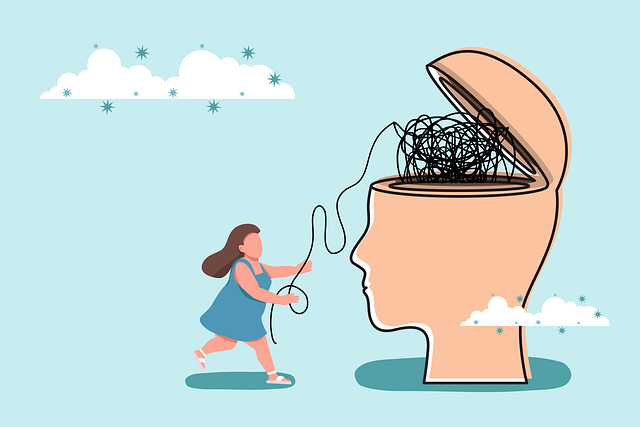Parker Chronic Illness Therapy tackles the global stigma surrounding mental illness through comprehensive initiatives. By producing educational programs, podcasts, and coaching sessions, they raise awareness, foster empathy, and empower individuals to take control of their mental health journeys. Their approach integrates specialized therapy with holistic care for chronic physical conditions, promoting emotional healing and resilience. Peer support, media representation, and community engagement further reduce stigma, creating inclusive environments where people feel comfortable seeking help without judgment.
Mental illness stigma remains a pervasive barrier to treatment and recovery. This article explores targeted efforts to reduce this societal burden, focusing on education, integrated support models like Parker Chronic Illness Therapy, peer advocacy, and media representation. By understanding the roots of stigma and its profound impact, we can foster inclusive communities that embrace mental health awareness. We delve into practical strategies that challenge stereotypes, promote empathy, and ultimately, save lives.
- Understanding Mental Illness Stigma: Its Impact and Roots
- The Role of Education in Challenging Stigma
- Parker Chronic Illness Therapy: A Case for Integrated Support
- Peer Support and Advocacy: Breaking Down Barriers
- Media Representation and its Power to Transform Perception
Understanding Mental Illness Stigma: Its Impact and Roots

Stigma surrounding mental illness is a pervasive and damaging issue that affects individuals across the globe. It often arises from a lack of understanding and inaccurate perceptions, leading to discrimination and social exclusion. This stigma not only hampers those struggling with mental health challenges but also creates barriers to accessing much-needed support and treatment. At Parker Chronic Illness Therapy, we recognize the profound impact stigma has on an individual’s overall well-being and society as a whole.
The roots of this stigma can be traced back to societal fears and misconceptions about mental illness. Historically, mental disorders have been misunderstood and often attributed to personal weakness or spiritual possession. Such beliefs perpetuate the notion that seeking help for mental health issues is a sign of failure or something to be ashamed of. This has led to a culture where people are reluctant to discuss their struggles openly, further isolating those already facing significant challenges. To combat this, various initiatives such as Mental Wellness Podcast Series Production and Mental Health Education Programs Design focus on raising awareness, fostering empathy, and promoting accurate information to dispel these myths and reduce the stigma associated with mental illness. Additionally, the development of Mental Wellness Coaching Programs can empower individuals to take control of their mental health journey while offering much-needed support.
The Role of Education in Challenging Stigma

Education plays a pivotal role in challenging the stigma surrounding mental illness, as it helps to dispel myths and foster understanding. By integrating comprehensive mental health education into schools and community settings, individuals can develop a deeper appreciation for the complexity of psychological conditions and the diverse experiences of those affected. This approach, backed by research from Parker Chronic Illness Therapy, underscores the importance of early intervention and normalizing conversations about mental health.
Moreover, professional development programs focused on mental health literacy for educators and healthcare providers, such as risk assessment training for mental health professionals, contribute to a more nuanced public awareness campaigns development. Cultural sensitivity in mental healthcare practice is another critical aspect, ensuring that education initiatives are inclusive and respectful of diverse backgrounds. This holistic approach not only reduces stigma but also promotes effective support systems for individuals navigating their mental health journeys.
Parker Chronic Illness Therapy: A Case for Integrated Support

Parker Chronic Illness Therapy offers a promising approach to tackling mental health challenges by providing integrated support for individuals dealing with chronic conditions and co-occurring mental disorders. This holistic treatment model recognizes that chronic illnesses, such as diabetes or heart disease, often coexist with psychological issues like depression or anxiety. By combining specialized therapy with comprehensive care, Parker aims to address both the physical and mental aspects of a patient’s well-being.
The program focuses on trauma support services, targeting the root causes of emotional distress that may arise from chronic illness management. Through various therapeutic techniques, it facilitates depression prevention and encourages emotional healing processes. By offering tailored interventions, Parker Chronic Illness Therapy strives to improve patients’ overall quality of life, enabling them to cope with their conditions more effectively while nurturing mental resilience.
Peer Support and Advocacy: Breaking Down Barriers

Peer support and advocacy play a pivotal role in reducing the stigma surrounding mental illness. By fostering open conversations and sharing personal experiences, individuals with lived knowledge of mental health challenges can break down barriers and offer valuable perspectives. This approach, often facilitated by organizations like Parker Chronic Illness Therapy, empowers those affected to speak out against stereotypes and promote understanding within their communities.
Effective peer support involves the development of strong communication strategies that encourage honest dialogues. Mental health professionals can enhance these efforts through risk management planning, ensuring a safe and supportive environment for both clients and advocates. Such initiatives contribute to a holistic strategy aimed at improving emotional well-being promotion techniques, ultimately leading to more inclusive and compassionate communities.
Media Representation and its Power to Transform Perception

Media plays a pivotal role in shaping societal perceptions about mental illness, and its influence cannot be understated. Portrayals in films, television shows, and news media can either reinforce harmful stereotypes or offer a platform for raising awareness and promoting understanding. Positive representations of individuals navigating mental health challenges, as seen in initiatives by Parker Chronic Illness Therapy, encourage empathy and dispel myths. By showcasing diverse characters leading fulfilling lives despite their struggles, these efforts contribute to a more accepting culture.
The power of media lies in its ability to educate the public about various conditions, including depression, anxiety, and psychosis. Depicting accurate scenarios where individuals practice self-care, engage in emotional regulation techniques, and foster positive thinking can inspire viewers to seek support or encourage those around them to offer understanding. This shift in perception is crucial for reducing the stigma associated with mental illness, fostering a supportive environment, and ensuring individuals receive the help they need without fear of judgment.
Mental illness stigma, a pervasive barrier to treatment, can be significantly reduced through concerted efforts. By educating communities, challenging misleading beliefs, and promoting peer support, we can foster an environment of understanding and acceptance. Integrated approaches like Parker Chronic Illness Therapy offer comprehensive care, while media representation plays a pivotal role in transforming public perception. Through collaborative actions and open dialogue, we can break down barriers and ensure those facing mental health challenges receive the support they deserve.














